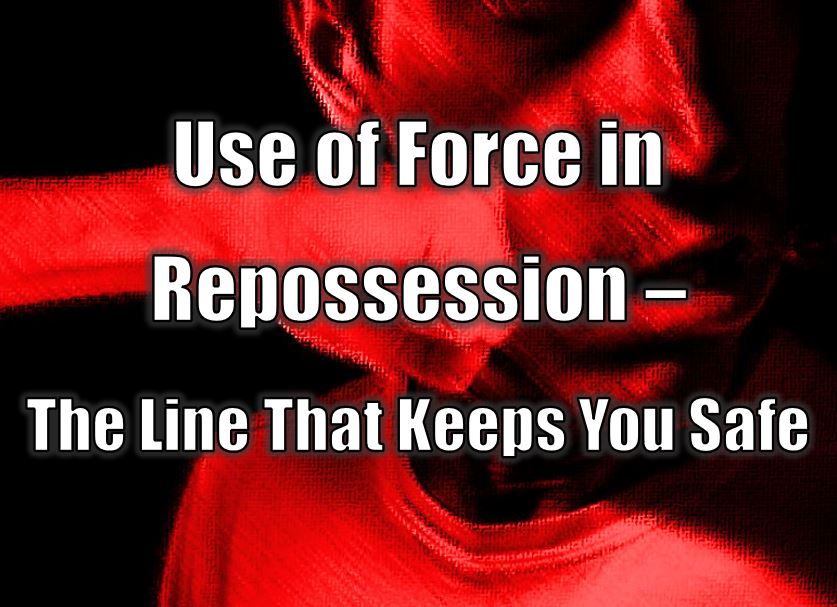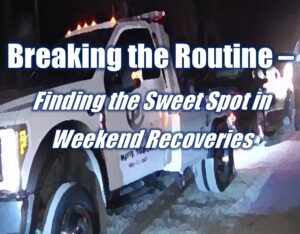Additional Commentary on Ron Brown’s “Force Continuum”
GUEST EDITORIAL
Ron Brown’s recent article on the force continuum provided essential knowledge every operator should understand. His breakdown was clear and instructional—worth revisiting regularly. But as with everything in this business, the gap between knowing and doing often determines whether you operate safely or face unnecessary tragedy.
I’m not challenging Ron’s framework—in fact, I urge everyone on my team to study it thoroughly. However, we need to place the force continuum within the legal and cultural realities we navigate daily.
Let me be absolutely clear: if you’re a recovery agent and someone points a gun at you and tells you to leave… you leave.
No debate. No bravado. No escalation.
You don’t “climb the ladder.” You drop the rope and walk away.
“No Means No” — and “Go Means Gone”
When someone in control (control is key, not ownership) of the property says “leave,” they’ve issued a command that immediately ends your legal ability to proceed with the recovery. Period. A firearm doesn’t have to be fired to send the message. Its presence alone is an instant shutdown notice.
This isn’t about what’s “right” or whether you had “a right to be there.” Those arguments carry zero weight in the moment—and even less when regulators, attorneys, and grieving families get involved.
Our job is civil. That word matters.
Repossession is not self-defense work. It’s a civil process governed by UCC §9-609, which imposes a simple but absolute condition:
It must be conducted without breach of the peace.
The second peace is in question—whether it’s someone pulling a weapon (extreme) or simply saying “You’re not taking my car” (the other end of that extreme)—you’re operating outside the bounds of lawful recovery.
Act accordingly.
“Stand Your Ground” Is Not a Recovery Strategy
Let’s address “Stand Your Ground” laws. These state-specific statutes eliminate the duty to retreat under certain circumstances. Sound principle, but here’s the uncomfortable truth: they don’t apply to us when we’re on someone else’s property attempting to take their possessions.
Even in states with stand-your-ground provisions, self-defense laws only activate when you’re not the aggressor and have no safe avenue of retreat. In repossession work, you’re expected to withdraw at the first sign of confrontation. The law doesn’t care that you were “in the right.” It only cares that you had an opportunity to disengage—and didn’t take it.
If you’re thinking, “What if I felt threatened?” That’s precisely the point. You were threatened— and your exit was obvious. You were told to leave. There’s your off-ramp.
We aren’t law enforcement. We aren’t security personnel. We don’t carry badges, and we certainly don’t have the luxury of ego.
Policy Over Pride — Every Time
On our team, “No Follow, No Chase” transcends training manual rhetoric—it’s a cultural mandate. We teach our people not just proper procedures, but what not to rationalize when tensions escalate. “Just because you can, doesn’t mean you should” resonates throughout our operations. And when firearms enter the equation, “you shouldn’t” becomes “you absolutely must not.”
We don’t need heroes. We need professionals who return home safely each night. We document denials. We record threats. When customers tell us not to return, we treat that instruction like a formal cease and desist.
At the slightest indication of danger, we disengage and inform the client. If they wish to pursue the matter, they do so through proper legal channels.
Respect the Threat Before It Respects You
Let me be direct: if someone points a weapon at you and you’re still contemplating whether to stand your ground—you’ve already made your critical error. That mistake could end your life, cost someone else theirs, or jeopardize your entire company. In today’s world, cameras don’t stop recording just because you deemed the situation unfair.
Force may technically be an option under law. That doesn’t make it prudent in practice.
You don’t win civil proceedings by surviving a gunfight. You win by ensuring one never occurs.
“Better To Be Tried By 12 Than Carried By 6”
It’s a moniker that’s followed me from my law enforcement days—and for good reason.
Never allow yourself to be in a position where you don’t have a safe exit or where you’ve let your guard down to the point you’re now forced to justify your actions after the fact. If you can’t execute the repossession without stepping into a high-risk situation, walk away. The job isn’t worth the fallout.
There will be moments—rare, but real—where you are fully engaged and forced to defend yourself. I believe that’s the scenario Ron’s article speaks to: the moment where no other options remain. If you ever find yourself there—facing immediate harm with no path out—you should expect everything that follows to be scrutinized.
At a minimum, you’ll need legal counsel. Because if force is used, especially deadly force, there’s a good chance you’ll face a courtroom—and a jury of twelve.
Legal Considerations
Ever wonder why the Miranda warning begins with “You have the right to remain silent”? It’s because that’s the single most important piece of legal advice you’ll ever receive. If you find yourself in a situation where you’ve used force—regardless of whether it was lethal or not—you not only have that right… you absolutely should use it.
The second part of the warning? “You have the right to an attorney.”
That comes after silence for a reason: your attorney is important, but keeping your mouth shut is more important. If you’re feeling pressure and don’t trust yourself to stay quiet, say these five words:
“I want an attorney now.”
Say nothing else.
As someone who’s been in this industry and served as a criminal investigator, I’ll put it plainly:
You’ve been warned.
Final Thoughts
Ron’s breakdown of the force continuum provides a solid framework. This editorial isn’t a contradiction—it’s a companion piece. It’s a reminder that understanding when you can use force differs fundamentally from recognizing when you should absolutely not.
If you’re in this profession, make no mistake—your responsibility is to walk away when situations cease being civil.
Not because you lack courage. Because you possess wisdom.
Be Safe, Healthy, & Blessed,
Use of Force in Repossession – The Line That Keeps You Safe
Wes Carico
Nostalgic Towing / Artis Recovery
Related Articles and More from Wes:
Can I Defend Myself or Others?
Get the increase, cut the contract, or close the doors
Ancillary Fees – The Associated Issues with Safety and Quality
Undervaluing Services – No Simple Fix, But the Responsibility Is Obvious
Framing the Conversation – Increases Are All About the Numbers, Not The Virus
Repossession Obsession – Questions Consumers, Legislators and Lawyers May Want to Start Asking












More Stories
Repo Agent Wrestles Shotgun from Borrower
Bad Apples in the Repossession Industry
Repo Rampage in Rural Texas
Why Self-Help Repossession Is Taken for Granted — and Why Losing It Would Hurt Consumers Most
Arrest Made for Attempted Murder of Repossession Agent
A Necessary Distinction: Financial Oversight vs. Financial Control